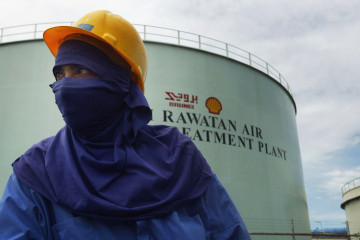

Despite a distance of thousands of miles, Brunei shares many features with the kingdoms of the Persian Gulf. Like Qatar, Saudi Arabia, and their neighbors, Brunei counts itself as an Islamic monarchy rich in oil and gas reserves that fuel its economy and lend it outsize geopolitical heft.
As climate change looms large, Brunei now finds that it also has a key goal in common with its Gulf counterparts: hastening an already-urgent transition from fossil fuels to renewable energy, a quest that Brunei can fund with its substantial profits from the petroleum industry.
Brunei’s ambitions have grown in recent years.
In 2014, the Southeast Asian sultanate indicated that it planned to derive just 10 percent of its power from renewable energy by 2035. During a 2021 trip to Singapore, however, Bruneian Energy Minister Awang Haji Mat Suny bin Haji Md Hussein declared that his country had tripled that number. He said that Brunei’s new strategy for energy security involved getting 30 percent of its electricity from renewable energy by 2035.
"As the Bruneian Energy Department boasts on its homepage, the energy industry accounts for most of Brunei’s gross domestic product at 58.8 percent"
Hussein suggested that Brunei would realize its objectives for renewable energy by “enhancing private sector participation through public private partnership in the financing and undertaking of renewable energy development projects.” He was describing a strategy of cooperation several years in the making.
In 2016, Bruneian officials prepared a report outlining “plans to introduce renewable energy policy and regulatory frameworks that will stimulate investment both by the government and the private sector in developing and deploying renewable energy.”
Brunei has already attracted collaborators from a variety of sectors. In 2013, a team of academics from Bruneian and Indian universities published a study that affirmed “the technical feasibility of grid-integrated solar power plants in” the sultanate.
Reinforcing these conclusions, Brunei had already been operating its first photovoltaic power station for two years by the time of the study’s publication. The sultanate launched its second solar power plant in 2021.
The private sector has supported these projects. Mitsubishi Corporation worked with Brunei on the first solar park, and the second saw the involvement of Brunei Shell Petroleum, a joint venture between Brunei and Shell.
New Bruneian companies likewise seem eager to participate in the transition to renewable energy. Quaezar Engineering and Construction, founded in 2015, bills itself as “a Bruneian-owned and registered company specializing in solar energy and electrical works.” The firm notes that it has even outfitted “government facilities” with its wares.
|
Collaboration seems core to Brunei’s overall approach to sustainable development. Several ministries joined Mitsubushi and Green Brunei, an environmental organization, in undertaking the Environmental Education Tour Project, an initiative meant to showcase the importance of solar power to the public. Mitsubishi framed it as part of Brunei’s effort “to increase the widespread use of renewable energy technologies through public awareness and education.”
The Bruneian embrace of renewable energy has as much to do with economics as with climate change. As the Bruneian Energy Department boasts on its homepage, the energy industry accounts for most of Brunei’s gross domestic product at 58.8 percent.
Fossil fuels comprise over 90 percent of Brunei’s exports and the majority of its government budget. Making economic diversification all the more important, a 2021 BP report predicted that the sultanate would exhaust its oil reserves in 27.3 years and its supply of natural gas in 17.6 years.
Brunei’s investments in solar parks will help it pursue the parallel goals of climate change mitigation and economic diversification. Some analysts even argue that the sultanate should make its plans more ambitious. In 2019, a pair of analysts with the ASEAN Center for Energy, a think tank affiliated with the Association of Southeast Asian Nations, wrote an op-ed urging Brunei “to go big with renewable energy” and “play a bigger role with sustainable energy.”
The op-ed recommended that Brunei follow the examples of the Gulf monarchies and in particular the United Arab Emirates. Based on the Energy Strategy 2050, the Emirates expects to get 44 percent of its “energy mix” from “clean energy”—a greater percentage of renewable energy than Brunei, if over a longer timeline.
The ASEAN Center for Energy proposed that Brunei “follow the lesson from the UAE in how they are using its oil revenue to support the ambitious target of renewables and assist the RE market to be fully developed.”
In the two years since the op-ed’s publication, ASEAN has recognized Brunei as a model in its own right. In 2021, Brunei Shell Petroleum received the ASEAN Outstanding Engineering Achievement Award for its support for the development of Brunei’s second solar power plant.
In fact, the involvement of a Bruneian company at the heart of the petroleum industry in that project illustrated the ASEAN Center for Energy’s point: Brunei, like the Emirates and other countries in the Gulf, could leverage fossil fuels to finance renewable energy.
The faster Brunei expands its goals for renewable energy, the sooner the sultanate will diversify its economy and minimize its contributions to greenhouse gas emissions. For the next two decades, Bruneian officials can continue to tap fossil fuels that, though contributing to climate change, can also finance their country’s transition to renewable energy.
Austin Bodetti is a writer specialising in the Arab world. His work has appeared in The Daily Beast, USA Today, Vox, and Wired
![Workers maintain pipes at oil and gas processing facilities at Seria in Brunei [Getty Images]](/sites/default/files/2023-02/GettyImages-51268948.jpg)




 Follow the Middle East's top stories in English at The New Arab on Google News
Follow the Middle East's top stories in English at The New Arab on Google News


